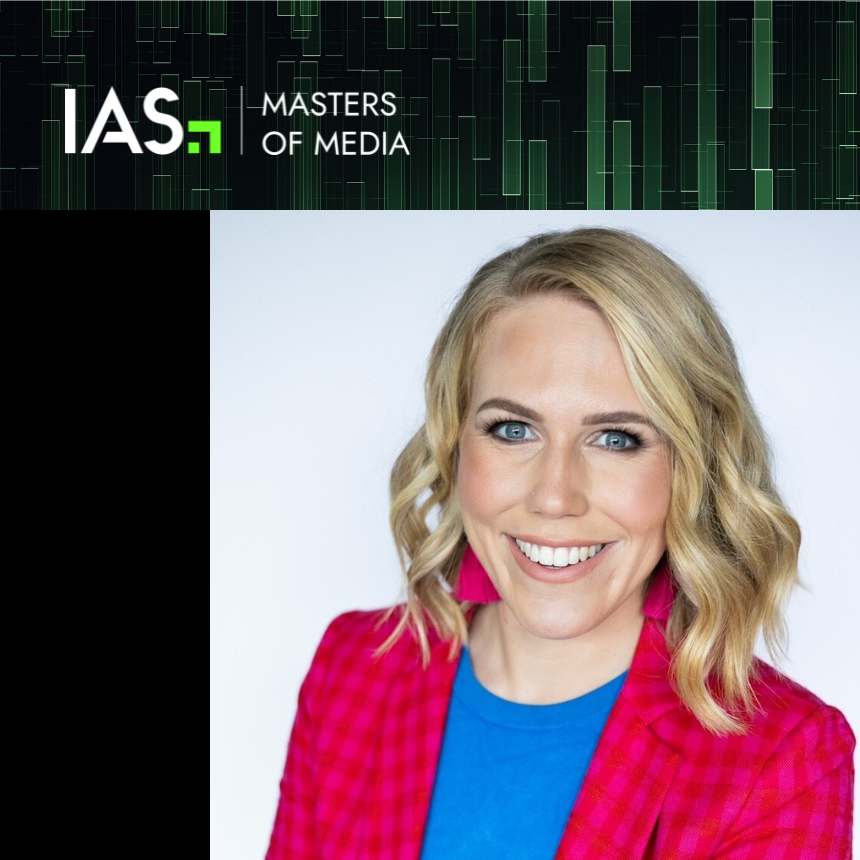
In this exclusive “Masters of Media” series, Integral Ad Science (IAS) speaks to the Movers and Shakers of the APAC advertising industry on all digital matters.
Isabella (also known as Bella) Spragg is the Director of Partnerships, APAC, at Media.Monks. After almost a decade of commercial lawyering, Bella moved into the digital media/advertising world, joining the American digital media start-up, MightyHive, as its first operations focused employee in APAC. Over 6.5 years with the company (now called Media.Monks), Bella has been a media trader, led account management teams and focused on growing the business through its tech vendor relationships. In her current role as Director of Partnerships, APAC, her focus is managing Media.Monk’s regional corporate relationships with key strategic technology partners to drive growth and maturity for the business (and its clients). In December of 2022, she was also awarded Google Marketing Platform’s Practitioner of the Year and is an inaugural member of the Tealium Partner Advisory Board.
Outside of work, Bella is a wife, mum to two little boys, deeply obsessed with her ageing (gracefully) aussie bulldog named Meatball, a book lover, gigantic sweets lover and, most importantly, a Survivor fanatic.
Questions:
IAS: Please tell us about your journey in digital media and your current role at Media.Monks
Isabella: My journey into the digital media/ advertising world started as the fun police ensuring the copy on advertising campaigns wasn’t breaching any laws, and the ‘Terms & Conditions’ listed at the bottom were jam packed with all the good legal stuff. At that point in my career, I had no value for how powerful those M-RECS were and how many more I’d see in my life! I’d been lawyering for almost a decade and was feeling super burnt out when a friend was approached to open the APAC office of an American digital media start-up focused on reselling and servicing Google Marketing Platform (at the time it was called Double Click). He was just beginning his search for staff and I’d decided I was ready to jump ship into something different. Seven interviews later, copious amounts of research into what digital media actually was, how it worked and trying to understand why there were so many acronyms – I landed myself a job as the first operations focused employee in APAC (and I think I was within the first 40 employees globally). We swiftly hired a bunch of smart folks straight after me and boom, shots fired – our race was off!
What “they” say about joining a rocketship start-up during the tech boom is true. Within a year, I had been to Mexico for the weekend to celebrate the company’s birthday, multiple trips to San Francisco and all around Asia. My career progression was equally as crazy – within about 18 months, I was leading a team of 6 people working with all sizes of businesses (from small to enterprise) and independent agencies educating and activating digital media campaigns for them.
I’ve also stepped out of the hustle and bustle twice to have my little boys. During one of those times, MightyHive was purchased by an even bigger rocket – S4 Capital. And with that, came the name change to Media.Monks plus new friends, new businesses with different tech vendor relationships, almost 10,000 incredibly talented people, a clear POV on market trends/topics and strong messaging around our direction + future.
After 6.5 years and a few grey hairs – I’m still here! My current role is Director of Partnerships, APAC. In conjunction with our global partnership team, relevant go-to-market teams, capability leaders and epic growth team, I am developing our APAC partnership offering. My focus is on growing and maturing our regional corporate relationships with key strategic technology partners plus identifying and building out new service offerings alongside innovative independent tech players within the media, data and creative space.
IAS: AI-powered platforms such as ChatGPT have created a lot of buzz in various industries across the spectrum. How do you think AI will influence digital media, and transform the industry in the near future?
Isabella: Evolution is inevitable, right? It transforms our industry, pushing it to change and grow. When programmatic hit our trading desks, people proclaimed it would be the end of thousands of jobs. Whilst some may have shifted roles, it made us better, smarter, and more efficient media traders. Inefficient workflows were reduced and people were able to access more data to make educated and strategic decisions. I take a similar view with Generative AI and its powerful necessary impact on our industry – across all disciplines from data, media, and the cool stuff happening with creativity. Again, it’ll work to make us better at our jobs – leading to a pivot and upskill in labour, maturation of industry needs, shift in priorities, increase in efficiency but ultimately, it’ll result in better work being done.
The real concern for our industry is not how AI impacts it, rather it’s how brands are being educated on what this change actually means (and it’s certainly not operational efficiency meaning fewer people and translating to a healthy bottom line) as well as completely understanding Generative AI beyond buzzwords. No point hiding in the shadows with this one i.e. our industry needs to be upskilling and creating a point of view on how generative AI can assist brands. Agencies/consultancies providing services around the adoption or incorporation of Generative AI – (through education, implementation, change management, efficiencies and upskilling of labour, etc.) are sure to not only win this transition phase but be market leaders embracing the future.
In the spirit of inclusivity, I asked ChatGPT what it thought of its impact on the digital media industry: “AI is already transforming the digital media industry and will continue to do so in the near future. Through personalised content, content creation, enhanced user experience, better data analytics and improved search and discovery. Overall, AI is likely to play an increasingly significant role in the digital media industry, helping companies create more personalised and engaging content, improve user experience, and streamline processes”.
IAS: What advice would you give to someone starting their journey in digital media?
Isabella: Hold on tight – this industry is a wild (often fun, sometimes stressful, but generally great) place to be. There are constant evolutions, huge pieces of work to be done, you’re surrounded by some seriously smart people across data, strategy, media, and creative who do work that drives consumerism whilst invoking all the feels with customers. The people in this industry know people/customers. They know what we want, what motivates us, how we want to spend money, where we want to spend it and when. It’s pretty amazing to watch the impact of the work we do and realise how powerful it is.
Plenty of folks laugh whenever I say I’m in the advertising industry; then I laugh at how the beautifully engaging ad they saw this morning whilst scrolling on social media coming into work, which lead them to check out the brand’s website or research the product further, will continue to resurface at all the right times until that person decides to purchase it and absolutely none of that was by coincidence rather, it was completely strategic and planned. Watch their eyes light up with a touch of intrigue mixed with fear!
IAS: Since brands are now bringing trading in-house, many parts of the industry are pivoting to a consultancy framework. How do you see the media landscape evolving with respect to this?
Isabella: It’s that same old story of evolution. Here the industry is successfully maturing from being the “doers” to utilising that tried and tested expert knowledge to educate others to “do”. The whole ‘give a man a fish and you feed him for a day; teach a man to fish and you feed him for a lifetime’ concept is playing out. This movement allows brands to have more control, whilst leaning on experts to provide strategic input, training, education coupled with, no doubt, short term bursts of ‘hands on keyboards’. It’s a win that builds trust through transparency.
We will also see the creation of new service avenues around publisher relationships. As inventory quality will be assessed more deeply (i.e. due to an increase in data requirements, and publishers needing to understand their buyers more due to working directly with them). Direct sales will evolve from working with a handful of agencies to hundreds of individual in-house teams. Will this lead the industry to shift towards partners who work with brands to assist with inventory deals? Or, do publishers become far more accessible through increased awareness campaigns, easy to use self-service platforms and education pieces?
IAS: In your opinion, what measures can the advertising industry take to combat the trust and transparency challenges in the digital supply chain?
Isabella: Before we turn to the continued changes required, acknowledgement of the great strides already made in our industry is necessary. Over the last few years, the industry has put this issue front and centre and we’ve seen a strong evolution and improvement in trust and transparency across our supply chain; bolstered by both legislative changes and deep commitments from Vendors.
But, the key to maintaining the momentum comes down to accountability from agencies and brands. In my opinion, both are now aware of what to ask, educated on what good looks like and, often, demand more from inventory partners or DSPs.
Continued transparency will be driven as publishers prepare for the impact of cookie deprecation and how these supply chains are enhanced to maximise the connection of 1st party data sources; solving for addressability between logged in on site audiences and brand customers. Another initiative in combating trust and transparency issues comes with everyone speaking the same language. Standardising industry terminology, especially in reporting, reduces those pockets of misalignment, misinformation or reduced information sharing that result in a weakening of trust.
IAS: Any advice for leaders on talent retention and supporting/ encouraging diversity at workplaces?
Isabella: I recently read that most people leave a job due to their direct leader. Our industry has its fair share of awesome leaders, so my advice for any business would be to stop and take stock of your leaders (from middle management to c-suite) – who could do with a little additional support/coaching that allows them to invest time in growing their people, who is doing a wonderful job at retaining talent and deserves a shout out for it and where are the up and coming superstars in the business that management should nurture.
More importantly, don’t be scared of the “mum returning to work”. I can guarantee she will work 5 times more efficiently and effectively whilst, probably, leaving at 4:30 to get her kids from day-care/school; but the job will be done with serious dedication. Obviously coming from a position of total bias.
IAS: What’s your favourite book/podcast/movie and why?
Isabella: I am a book nerd and always have something on the go. I recently finished Bewilderment by Richard Flannigan, which I highly recommend. Otherwise, my other current favourite is Educated by Tara Westover.
 Share on LinkedIn
Share on LinkedIn Share on X
Share on X

